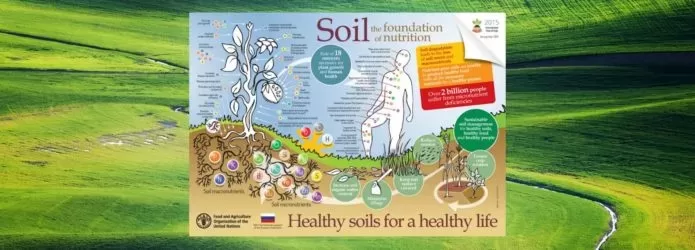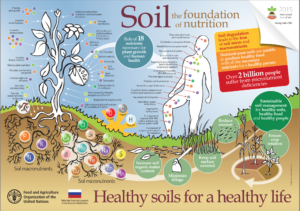
Healthy Soils for a Healthy Life.
Lest we forget that we as humans are part of the earth’s ecosystem. We get our nutrients from the plants and animals we eat (many of which eat the plants too) and the water we drink.
If the soil is malnourished, then we too will suffer.
The Food and Agriculture Organization of the United Nations focused on how “Over 2 Billion People Suffer from Micronutrient Deficiencies.” Many soils around the world, including many in the US are suffering from declining nutrient content.
For example, this illustration from the FAO highlights 18 nutrients necessary for both plant growth and human health — both Micronutrients like zinc, iron, calcium, copper, manganese and Macronutrients like phosphorus, nitrogen and potassium.
The good news is that sustainable soil management practices such as crop rotation, reducing erosion, and increasing soil organic matter content, also preserve nutrients.
In the meantime, until there is a turnaround in the nutritional value of our soil, I will continue to use a foundational multi-vitamin/multi-mineral product with most of my clients.
Soil quality affects the plants grown in the soil, many of which we eat directly; it also affects animal products that we eat — cows, chickens, etc., as they eat plant foods too.
Here are a few professional grade multivitamin/multimineral products that I recommend:
- Thorne Basic Nutrients 2/Day – 1 am, 1 pm
- Pure Encapsulations O.N.E. – one daily
- Integrative Therapeutics ProThrivers Wellness Multivitamin – formulated for cancer survivors post treatment
- Pure Encapsulations PureGenomics Multivitamin – formulated for people with SNPs in methylation pathways
Did you know that most multivitamins don’t contain much of the mineral magnesium? That’s because it’s a very large molecule and takes up too much room!
A stand-alone magnesium supplement that I like is Pure Encapsulations Magnesium Citrate, because it is a low dose, making it easy to increase incrementally.
Pesticides Affect Our Gut Microbes Too
While the FAO focuses on micronutrient deficiencies, the use of pesticides and other chemicals has radically changed the microbial content (soil microorganisms) of our soils. This affects the microbial balance in our GI tracts which is thought to have far-reaching affects on our health.
In addition, exposure to pesticides on foods can alter the diversity of the gut microbiome. Some species are more sensitive to the toxic effects of pesticides and decrease in number. Other species are more tolerant to pesticides and proliferate more as there is less competition for space and nourishment.
My “go-to” probiotic for gut microbiome support is MegaSporeBiotic.




